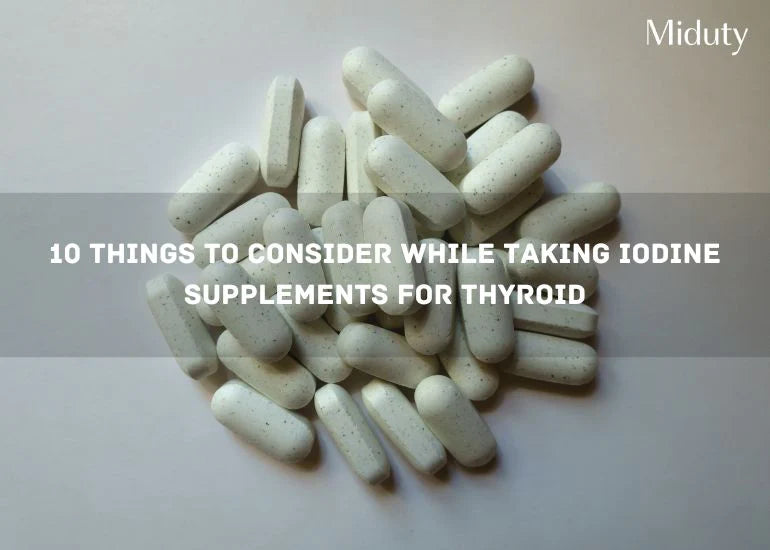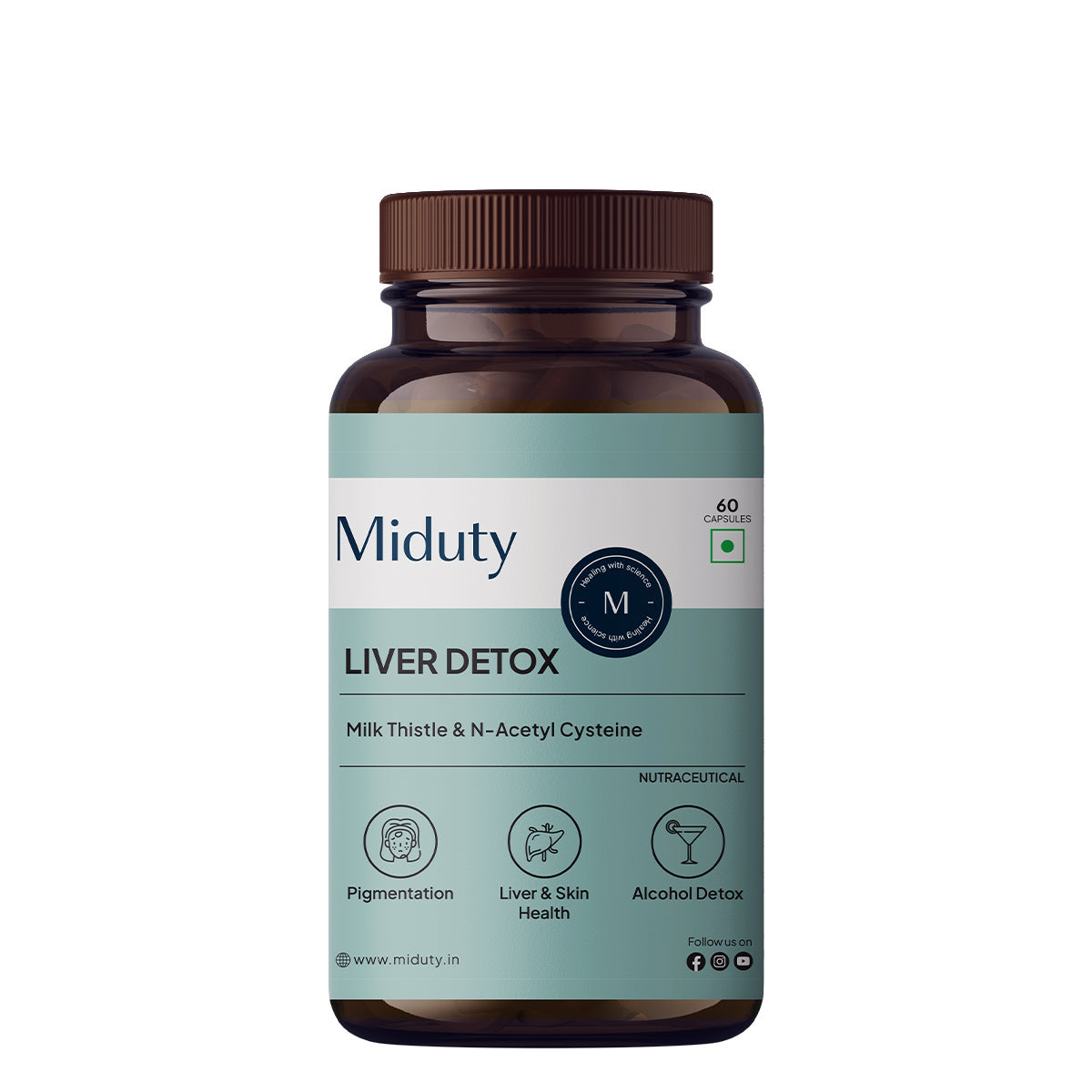
10 Things To Consider While Taking Iodine Supplements For Thyroid
 Share
Share
We are all aware that minerals are essential for thyroid health because they are needed for thyroid hormone production and regulation. To function properly, the thyroid gland needs several minerals, including iodine, selenium, zinc, and iron. Supplementing with necessary minerals that are known to have an impact on thyroid function is one of the most researched methods to support thyroid health.
Iodine is considered as one of the body's vital nutrients because it helps to control thyroid function, maintain a healthy metabolism, promote growth and development, and ward off some chronic illnesses.
Many foods contain trace amounts of it, including seafood, and iodized salt. Furthermore, consuming iodine supplements for thyroid for a long time can also lead to an excess of iodine in your body.
Iodine is essential for healthy growth and development, especially in children and pregnant women. The thyroid gland is in charge of producing two major hormones that regulate the body's metabolism: thyroxine (T4) and triiodothyronine (T3). These hormones are composed of iodine molecules, and a lack of iodine prevents the thyroid gland from producing enough hormones, resulting in hypothyroidism.
Have you ever heard of the saying "too much of a good thing can be bad for you"? Well, this phrase certainly applies to iodine as well, a mineral that is essential for thyroid function and overall health.
Yes, you have read it right! Excessive iodine consumption can result in iodism which can lead to hypothyroid.
However, too much iodine in your diet can be harmful to your health and, in some instances, cause hyperthyroidism (your thyroid gland produces too many hormones, disrupting the body's metabolic balance). So, if having too little iodine is bad, but having too much iodine is also bad.
Things You Need to Consider While Taking Iodine Supplements for Thyroid
1. Increase Fluid Intake

Sometimes, in order to fill in the deficiency, we start to consume an iodine-rich diet along with taking iodine supplements for the thyroid, which can lead to an imbalance of iodine in the body.
Drinking enough water and other liquids can help the body flush out excess iodine. Your body makes more urine when you drink fluids. This can help flush extra iodine out of your system faster.
Drinking fluids can assist in diluting the iodine concentration in your body. This can alleviate symptoms and make removing unnecessary iodine easier for your body. Drinking plenty of fluids, especially water can help in diluting the concentration of iodine in the body and reduce the symptoms such as upset stomach, skin rashes, and diarrhea.
2. Consume Iodine Rich Foods along with an Antioxidant-Rich DietAs we all know, iodized salt is not the best way to get iodine through food because it contains potassium iodide, which can cause high blood pressure and cardiovascular problems. Greek yogurt is an excellent replacement option. The iodine content in a 225-gram serving of Greek yogurt is 116 mcg.
In addition, you can also use Lugol's solution. Lugol's solution is also used as a dietary supplement to boost iodine levels. It is available in a variety of concentrations, with 2% being the most common. Lugol's solution is used to treat thyroid disorders like hyperthyroidism and Graves' disease because it can help reduce thyroid hormone production. You can use 6-7 drops of Lugol's solution.
Furthermore, you can consume antioxidants such as berries, dark chocolate, and green tea, which can help in the neutralization of free radicals (damaging cells) that may be created as a result of iodine. Antioxidants such as selenium, and vitamin c reduce the effect of excess and prevent the damage caused by it.
3. Make Sure to Get Enough Selenium while Taking Iodine Supplements for Thyroid

Selenium is an important nutrient that is essential for maintaining good health.
According to the National Center for Biotechnology Information, Selenium is required for the production of several antioxidant enzymes that protect the body from oxidative stress. It can also attach to excess iodine and help in its removal from the body.
In this way, selenium can help in the prevention of excess iodine in the body.
Dietary sources of Selenium include Brazil Nuts, Chicken, Fish, Nuts, and Seeds.
It should be noted that it may not be possible for you to get enough selenium considering your food choice and the availability. In such cases, a selenium supplement can be useful.
4. Eat Adequate Vitamin CVitamin C is a potent antioxidant that can protect against the negative effects of inflammation, muscle damage, and other health issues.
Research published in the National Library of Medicine reveals Vitamin C also has anti-inflammatory properties that can help reduce inflammation caused by excess levels of iodine. Because inflammation can cause pain, swelling, and other health issues, reducing inflammation can help relieve some of the symptoms of excess iodine.
Dietary sources of Vitamin C include Amla, Broccoli, Cabbage, and Cauliflower.
5. Consult Your Healthcare ProviderCertain medications, such as antithyroid medicine used to treat hypothyroidism or blood pressure prescription medicines used to treat heart disease, may interact with iodine supplements for thyroid.
If you take any medicines, discuss the safety of any supplements you're thinking about taking with a healthcare professional.
6. Take the Right Dosage of IodineAll kids and adults should frequently eat iodine since the thyroid gland generates hormones constantly. Also, pregnant women require more to maintain the growing fetus.
- 110 mcg per day birth – 6 months
- 130 mcg per day for babies 7-12 months
- 90 mcg daily for children 1-8 years
- 120 mcg daily for children 9-13 years
- 150 mcg per day for adults and adolescents over 14
- 220 mcg per day when pregnant
- 290 mcg during breastfeeding
To be sure about the iodine supplements for thyroid and dosage is right for your particular needs, it is advised to always see a healthcare professional before using a supplement.
7. Monitor Iodine Levels with a Patch Test

You can monitor iodine levels in your body by performing a simple patch test at your home. You will need an iodine solution to perform this test. Most pharmacies and health supply stores have iodine solutions, and you can also buy them online.
- Make a complete circle of iodine solution using a cotton swab on the inside of your forearm.
- You might also apply the iodine to your inner thigh or abdomen if you don't want to use it on your forearm.
- Iodine will stain, so make sure to let it dry for at least 20 minutes before covering it or allowing it to touch anything.
- For 24 hours, keep an eye on the iodine to look for any color fading. To keep track of how long it takes for the patch to vanish, check it every three hours or so.
- If the patch is still completely visible after 24 hours, you are most likely not deficient.
- If the patch disappears or fades significantly after 24 hours, you may be deficient in iodine.
- If the patch disappears in less than 18 hours, you may be suffering from a moderate to serious iodine deficiency and need iodine supplements for thyroid.
Iodine absorption can be improved by taking iodine supplements for thyroid with food. This is due to the fact that the presence of food in the stomach causes the secretion of digestive juices, including hydrochloric acid, which supports the breakdown of the supplement and the release of iodine. When you take an iodine supplement on an empty stomach, it can cause or worsen irritation or discomfort, resulting in stomach upset, nausea, or even vomiting.
Furthermore, food can slow the pathway of the iodine supplements for thyroid through the digestive system, giving the iodine more time to be absorbed.
9. Avoid Foods that Contain GoitrogensResearch published by the National Institutes of Health suggests that If you take iodine supplements, you should avoid goitrogens because they can interfere with iodine absorption and utilization by the thyroid gland. This can lead to decreased thyroid hormone production and even worsen thyroid disorder symptoms.
Cruciferous vegetables such as broccoli, cabbage, cauliflower, and kale, as well as soy products and some fruit and vegetables such as peaches and strawberries, are examples of goitrogenic foods.
If you take iodine supplements, you should limit your intake of goitrogenic foods or cook and boil them before eating them, as cooking can reduce their goitrogenic effect.
10. Avoid Iodine rich foods If Taking an Iodine SupplementMost individuals get enough iodine in their diets from iodized salt and other iodine-containing foods. Most widely available table salts, which are used in cooking and some processed foods, are iodized, or iodine-fortified.
It is generally not advised to eat iodine-rich foods if you are currently taking iodine supplements for thyroid. As a result, it's crucial to balance your iodine intake and stick to the suggested daily allowance, which for most adults is roughly 150 micrograms.
Seaweed, kelp, shrimp, salmon, dairy products, and iodized salt are a few examples of foods high in iodine.
Wrapping it up
To sum it up, iodine is an essential nutrient required for optimal thyroid function and overall wellness. However, excess consumption or prolonged use of iodine supplements for thyroid can lead to hypothyroidism. Therefore, it is important to follow the above-mentioned tips.
It is also crucial to speak with a healthcare provider to determine the proper dosage in order to make sure you are getting the optimal quantity of iodine. You should also drink more water, eat more foods high in antioxidants, make sure you get enough selenium and vitamin C, and use a patch test to check your iodine levels.
Be sure to talk to your healthcare professional about the safety of any iodine supplements for thyroid you are thinking about taking if you are taking any prescription medicines. Overall, keeping a healthy iodine balance in the body is critical for optimal health.
So there you have it, folks! Iodine supplements could be the missing piece in your thyroid puzzle, but before you start drowning yourself with seafood or supplements, consult with your pr.

